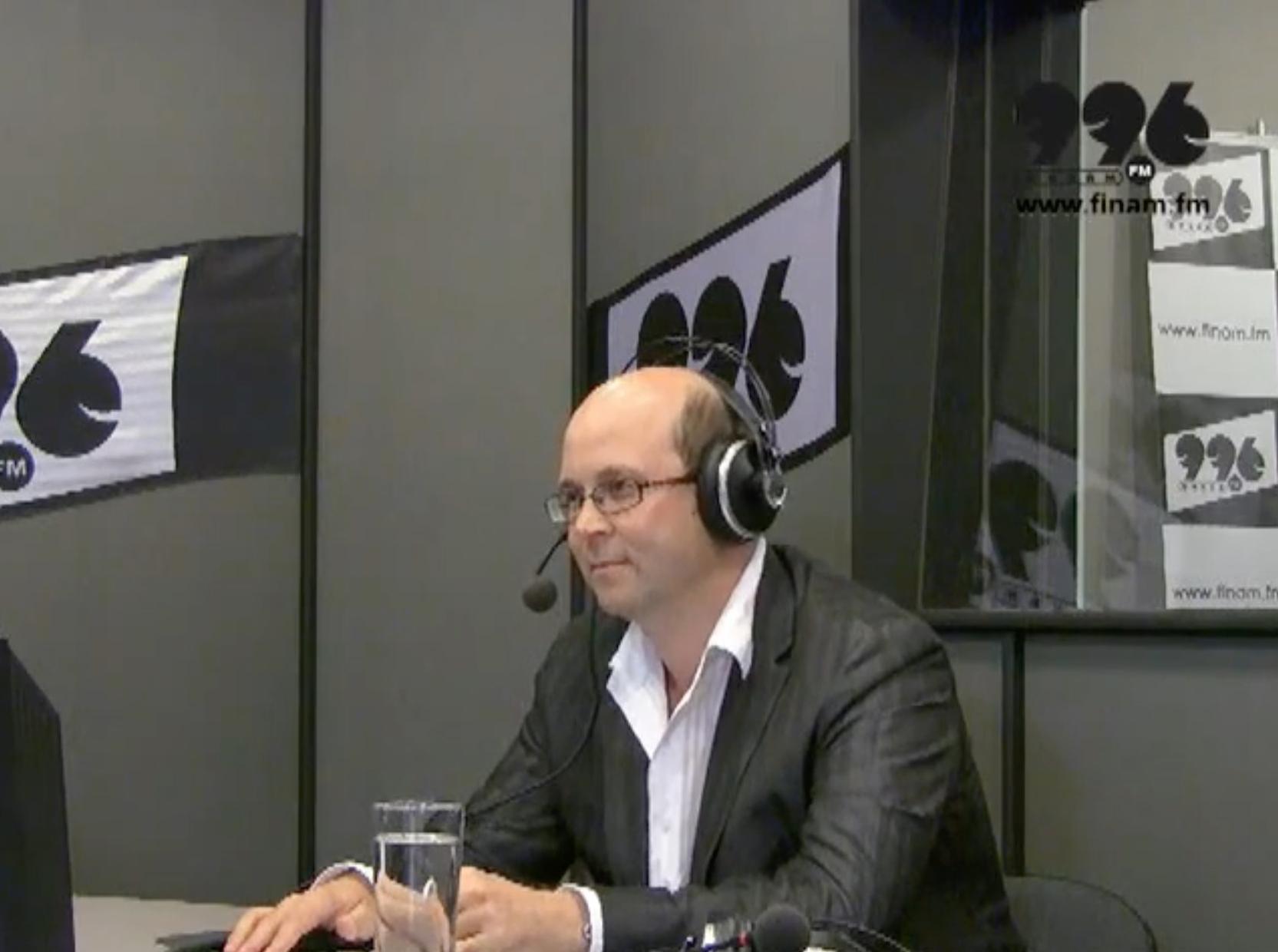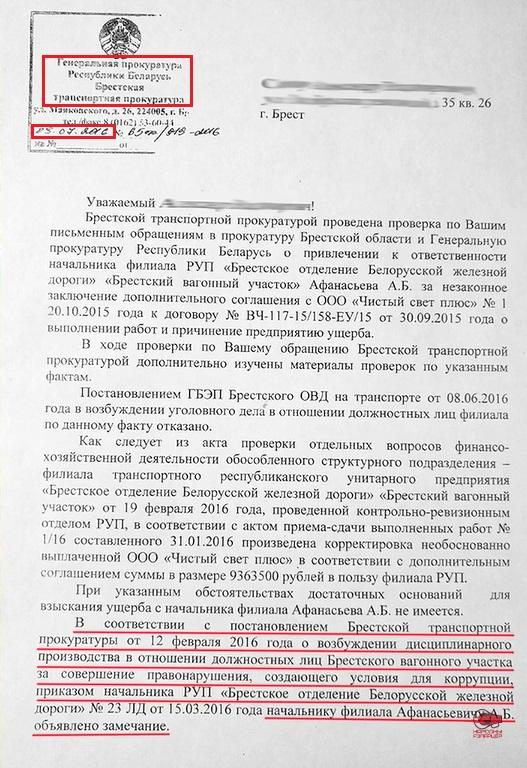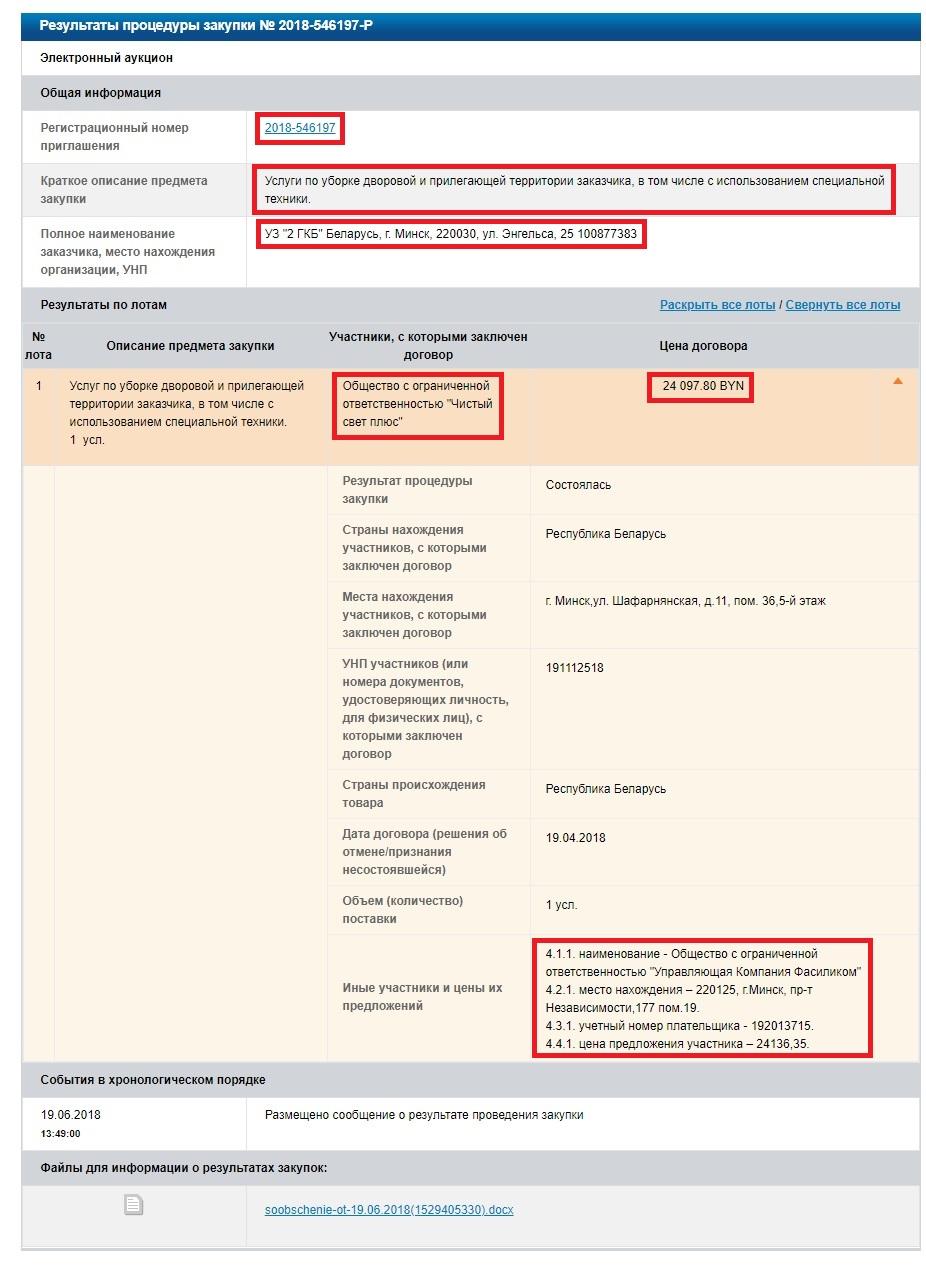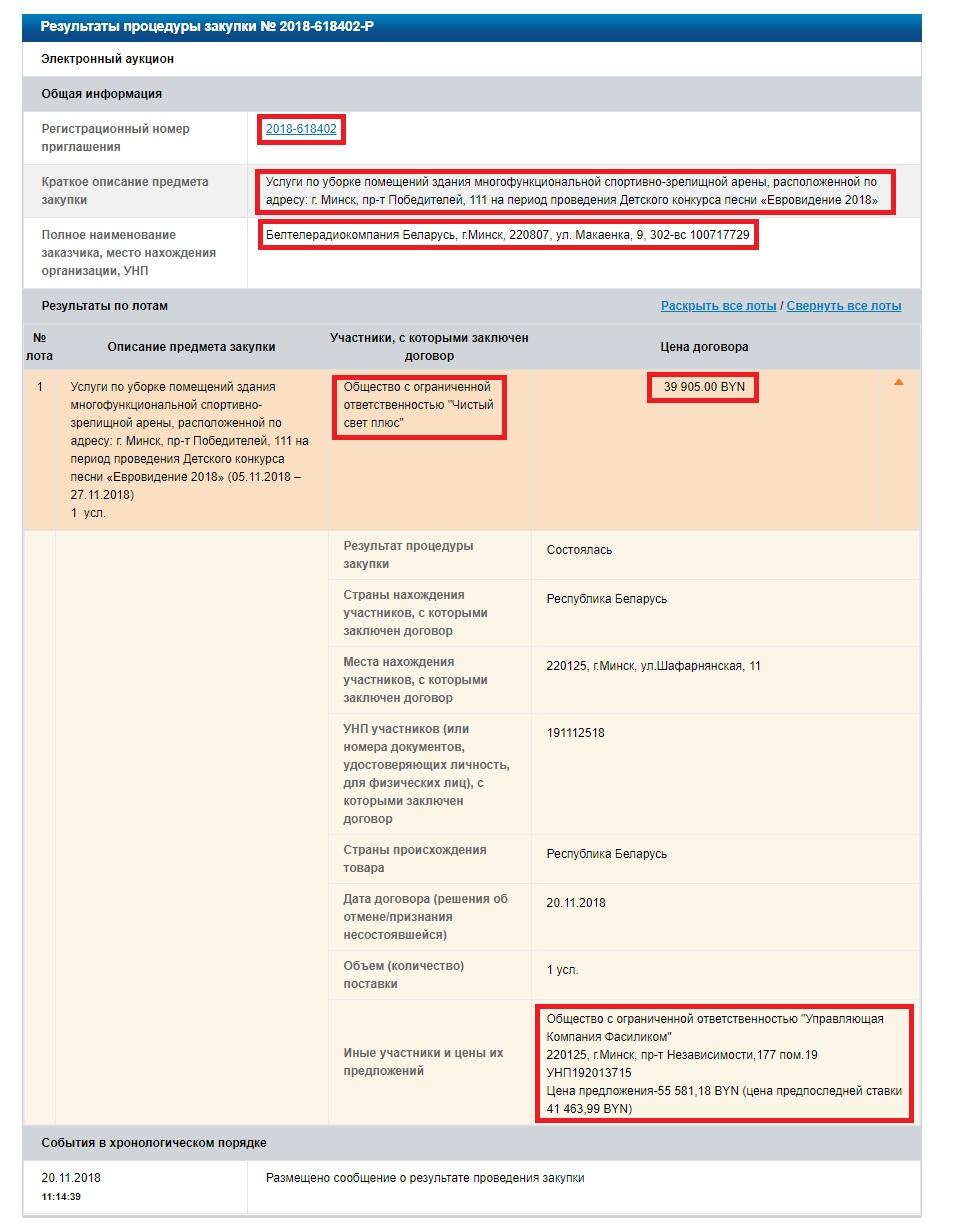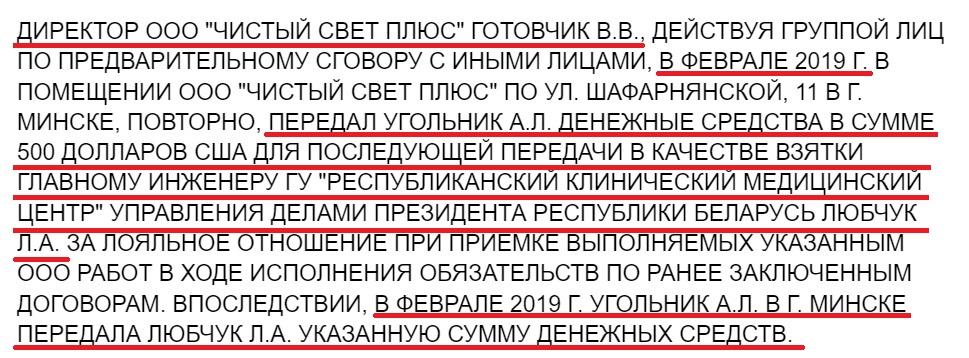The contract with the Brest wagon section
NN writes that the Belarusian Investigative Center (BIC) accuses the Chysty Svet Plus company of embezzling five million dollars from a tender for the maintenance of the Brest locomotive depot. Such allegations are not present in our investigation. Let's resume the chronology of events in this case.
On September 30, 2015, Chysty Svet Plus signed an agreement with the Brest wagon section. Almost three weeks later, on October 20, 2015, a supplementary agreement was concluded, based on which the value of the contract increased significantly. Aliaksandr Klachkou, the former master of the Brest wagon section, drew his attention to this matter. His comment is given in the material published by the Narodny Reparcior. According to Klachkou, the rates for some services under the contract were overestimated a thousand times. Klachkou complained about the actions of the head of the Brest wagon section to the state authorities. In February 2016, the control and audit department of the Brest Branch of the Belarusian Railways conducted an inspection. It revealed that the Chysty Svet Plus company, according to the act of acceptance and delivery of completed work dated January 31, 2016, unjustifiably settled a payment of 9,363,500 rubles.
The Brest transport prosecutor's office further conducted an inspection after Klachkou's appeal and sent him a reply. This letter is cited in the same material of the Narodny Reparcior. It says that there are no grounds for initiating a criminal case, but the head of the Brest wagon section was given a warning for "committing an offense that creates conditions for corruption." The prosecutor's office's response is dated July 2016. A few months later, on October 31, 2016, bg.media wrote about this story. "About 11 million rubles were paid to the wagon sections for the works performed at an inflated rate in November 2015, whereas, according to the original terms of the contract, their value slightly exceeded 1.6 million," the article says. The difference is exactly 9.4 million rubles.
Since the response of the prosecutor's office and the article were published after the denomination was introduced (since July 1, 2016), we assumed that the amounts are indicated there taking into account the denomination. If you convert 9.4 million rubles into dollars at the then exchange rate, you will get about 5 million dollars. This is the amount by which the original contract is inflated.
We are not ruling out that there could be a mistake in the calculations, and the amounts are indicated in non-denominated rubles. This does not negate the fact, however, that the rates for services were inflated. And, according to these inflated estimates, Chysty Svet Plus managed to complete some amount of work until the inspections began.
Tenders of the presidential medical center
Our article dwells on the simulation of competition in some tenders involving Apsit's companies and gives an example of one such tender. Let's weigh in on this one. On September 28, 2016, the Republican Clinical Medical Center under the Office of the President (Presidential Medical Center) announced a tender for work on complex maintenance of premises for the next year. You can view the documentation on this tender here. Thus, we did not indicate in the investigation that several participants applied for the tender, but not all of them made it to the auction on December 8, 2016.
The initial price of the electronic auction is 715,936.65 rubles. The bidding protocol features three participants: BELEZ, Chysty Svet Plus, and Fasilikom Management Company. BELEZ is part of the structure of the Office of Presidential Affairs, as is the medical center that announced the tender. Chysty Svet Plus and Fasilikom Management Company are controlled by the Apsit family. It follows from the bidding protocol that the BELEZ rate is 622,434.38 rubles with a 15% preference, the rate of Fasilikom Management Company is 620,787.72 rubles, and the rate of Chysty Svet Plus is 619,964.39 rubles. The Chysty Svet Plus rate turned out to be the lowest. It is, indeed, 13.4% lower than the initial price of the electronic auction, but only 0.1% less than the rate of the affiliated Fasilikom Management Company.
The thing is that companies must confirm their bids with an electronic digital signature (EDS), which is a mandatory condition for participating in trades. Chysty Svet Plus and Fasilikom Management Company confirmed their rates with EDS, while BELEZ did not. For some reason, is it not mentioned in the NN article. In the final report dated December 16, 2016, only two companies are indicated — Chysty Svet Plus and Fasilikom Management Company. That is, the commission selected the winner between these two.
Such situations with digital signatures occurred in other tenders for the presidential medical center involving Apsits companies. You can see them by the following links.
https://zakupki.butb.by/auctions/viewinvitation.html?auction=AU20151217049691
https://zakupki.butb.by/auctions/viewinvitation.html?auction=AU20181127158855
https://zakupki.butb.by/auctions/viewinvitation.html?auction=AU20181130159069
In addition, we found tenders of state organizations that had no other participants except the Apsit companies.
Source: Internet version of the information system Tenders www.icetrade.by
The involvement of affiliated companies in tenders is not prohibited by Belarusian legislation, but this practice is criticized. It basically resembles a competition between the left and right pockets of the same patch. For example, in Ukraine, companies related to Apsit were fined for imitating competition at Lviv railway tenders. You can read more about this case here.
Criminal case in Belarus
The investigation into Apsit's business in Belarus concerns not just tenders. The BRC material mentions the criminal case filed against Valery Hatouchyk, director of Chysty Svet Plus. It became known for the first time in March 2019. The Investigative Committee reported the arrest of the director of Chysty Svet Plus on charges of bribery.
With the help of Cyber Partisans, we learned the circumstances of this case. There are at least three episodes. According to the plots of Hatouchyk's case, it was he who bribed officials for various purposes. At least $2,500 to win the VTB Bank tender; $500 so that the alcohol holding Minsk Kristall settles for previously performed works; $500 to keep the Presidential Medical Center loyal to the work Chysty Svet Plus is doing. Furthermore, the chief engineer of the Presidential Medical Center Liudmila Liubchuk received a bribe in February 2019, and in July of the same year, the presidential clinic signed a new contract with Chysty Svet Plus.
In total, according to our calculations, following the initiation of the criminal case, Chysty Svet Plus signed contracts with various state institutions worth over one million rubles. While Chysty Svet Plus participated in tenders, the investigation of the criminal case against Hatouchyk continued.
The recent documents of VTB Bank and Minsk Kristall representatives use a different wording — they allegedly took possession of Hatouchyk's money under false pretenses. There is no such wording in the plot of the Liubchuk case. The documents state that she was given a bribe from Chysty Svet Plus for loyalty when accepting the work that the cleaners perform under previously concluded contracts.
The NN article suggests that Hatouchyk was sentenced to two and a half years for giving a bribe classified as "an attempt to commit a crime", but the representative of the alcohol holding escaped punishment. Surprisingly, he was not jailed when, according to NN, he demanded a bribe from Chysty Svet Plus.
Business in Russia
Next, let's move on to how the Apsits run business in Russia. Eduard and Elena Apsit own the Moscow company Fasilikom. She is the owner of several trademarks, including Chysty Svet and Chysty Svet. We make the world cleaner. Dozens of companies are licensees of these trademarks, and they are already participating in tenders. According to Russian law, the trademark owner and the licensee are jointly and severally liable if questions arise regarding the licensee's work.
In a written explanation for Latvian investigators, the company's lawyers said that in 1998, the family business of the Apsits expanded from Belarus to Russia. In 2006-2007, business in Russia was restructured. The Apsits moved from direct cleaning service provision to clients to subcontracting these functions. It was they who were already fulfilling customer orders. It is stated further that the cleaning business of the Apsits occupies a leading position on the Russian market and is known under the Chysty Svet trademark.
Latvian investigators also received explanations from the ABLV bank, where the offshore companies of the Apsits had their accounts. It follows from the bank's explanations that the source of the Apsits' income included cleaning in Belarus, Ukraine, and Russia. Some of the exclusive clients include the Kremlin, the Supreme Court, and the Central Bank of Russia.
We know from another source that the Apsits chose the strategy of working on the Russian market through subcontractors, in order to protect their business from possible problems with law enforcement agencies. That is, since the mid-2000s, the Apsits have not been making money in Russia directly, but rather through companies that have been granted licenses to use the Fasilikom trademarks. According to Russian laws, the licensor only grants the licensee the right to use the trademark, while under the franchise you can use not only the trademark but also production secrets, commercial experience, and goodwill.
Barracks in the occupied Crimea
Now let's move on to specific contracts. In 2015-2016, the Flahman Klin company won seven tenders of the Ministry of Defense for the cleaning of barracks in the occupied Crimea. On these contracts, the company received about 30 million euro from the budget. Flahman Klin was a licensee of the trademarks Chysty Svet and Chysty Svet. We make the world cleaner. In 2016, Flahman Klin was headed by Galina Sirotsinina. Before that, she worked at the company Chysty Svet Servis, which was owned by Eduard and Elena Apsit. NN does not mention this circumstance in its article. At the same time, while working in the occupied Crimea, the companies related to Apsit ran their business in Ukraine, where the companies controlled by him and his managers were caught manipulating tenders and fined.
Cartel conspiracy at tenders of the Ministry of Defense
In 2016, the Federal Antimonopoly Service (FAS) of the Russian Federation discovered a cartel conspiracy at auctions for the complex maintenance of military camps and other facilities. Nine companies took part in the bidding, which allegedly refused full competition, due to which all state contracts were signed with a slight decrease in the initial maximum price, that is, no more than 1.5%. During the investigation, the antimonopoly service managed to prove a conspiracy between 8 companies. The total amount of the initial maximum contract value was 28 million euros. You can review the materials of the case by following the link.
FAS mentioned two groups of conspiratorial companies. The first is the companies Komponent, Ekobalt, RusKompleks, Spetsresurs, and MegaLine. The Russian Anti-Corruption Foundation found out that they are related to Yevgeny Prigozhin.
The second conditional group included the companies Belyy Medved, Coralclean, and Millenium Clean. The companies were established in 2014 and liquidated in 2022. A chain from them leads to the Apsits. The managers and owners of all three companies at one time worked for companies that were licensed by Apsits to use the trademarks owned by Fasilikom. And Liudmila Chokoraya is not the only one among such people. There are five such people along with her, but NN in its article for some reason mentions only Liudmila Chokoraya. It's just that she is the only person we could reach. She confirmed that she worked for the Apsits, including the Coralclean company. The woman said that she does not remember anything about Coralclean's involvement in the conspiracy at the tenders of the Ministry of Defense, since she had other duties — she was responsible for the quality of work in the Fasilikom group of companies.
Let's go back to the case of cartel collusion since it yields some interesting conclusions. According to FAS materials, Belyy Medved, Coralclean, and Millenium Clean used the same IP address and MAC addresses when submitting bids. According to specialists of FAS of Russia, this testifies to "long-lasting and stable relations" between the companies. In addition, FAS documents indicate that applications for the competition were submitted by the same users. Furthermore, the same user applied for the auction on behalf of companies from different groups. For instance, Kantemir Yemishev submitted applications both on behalf of Komponent, RusKompleks, MegaLine, and on behalf of Coralclean.
Some files contained in applications created under the same account are identical in size and content. FAS concluded that tender documents were prepared jointly. Simply put, people related to Apsit colluded with people related to Prigozhin. Earlier, the publication of RBC found out that Prigozhin shared the military cleaning market with companies that may be related to the Fasilikom group.
Criminal case in Russia
The Apsits' business came to light in a criminal case not only in Belarus but also in Russia. The case was initiated in 2014 because the cleaners used illegal labor of migrants. The Moscow police did not disclose the name of the company, but we know from an informed source that it is Fasilikom. NN writes that migrants do not need a visa to enter Russia. However, it follows from the press releases of the police that they were hired without the required documents and, if necessary, would forge migration cards and work permits. At the same time, migrants complained about slave-like working conditions. In addition, they received a salary lower than the average market, which, according to police releases, "allowed the participants of the illegal business to receive additional material gain." In one of the interviews, Apsit explained the hiring of migrants as follows: "Overall, it is a matter of the price of the ticket. Migrants are cheaper for the client."
Business in different countries and money laundering
We are not accusing Apsit of any crimes. In our investigations, we show how he runs his business in different countries. And this business is accompanied by court cases, that is, in Latvia, his business is suspected of money laundering, and in Belarus, the top manager of his company is convicted of bribery.
In addition, we show that this business is conducted in different ways in different countries. In Belarus, the Apsits work directly through controlled companies and receive government orders from such institutions as hospitals, universities, railways, the National Library, the National Television and Radio Company, the Park of High Technologies, and others. At the time of publication, the total value of contracts for ten years is about 40 million euros at the exchange rate.
In Ukraine, Apsit owned the business directly together with his managers, but following the occupation of Crimea and the war in Donbass, he left the membership of all companies known to us. The Ukrainian group of companies Chysto, which Apsit is related to, cleans important strategic objects, while Apsit has Russian citizenship. Technically, however, he is not ranked in the list of the owners of the Ukrainian companies.
Meanwhile, as Apsit runs his business in Ukraine, its related companies receive orders from the Russian Ministry of Defense. In order to disguise such a connection, however, in Russia the Apsits do not work directly, but through subcontractors who use the Chysty Svet and Chysty Svet licenses. We make the world cleaner." That is, Apsit looks like a businessman who is trying to sit on several chairs at once.
Latvian investigators suspect that the funds earned in Belarus, Ukraine, and Russia were transferred to the accounts of offshore companies in the Latvian bank ABLV through fictitious credit and other agreements. They point out that, based on these agreements, millions of euros were transferred to the accounts of offshore companies of Apsit "with no economic logic" in order to disguise the origin of the funds. The law enforcement officers came to the conclusion that a special "laundry" was created under Apsit at the ABLV bank. By the way, the businessman was a secret shareholder of the bank through two Cypriot companies. According to OCCRP, he owned one percent of shares in ABLV and 21% in AmberStone Group, an investment company associated with the bank.
We have been talking to Apsit for about three hours and offered him to give us an extended commentary on camera, but he refused. In our investigation, we recounted his position elaborated by his lawyers. It consists in the denial of all that we wrote about above.
Grants for political prisoners and residence permits in Lithuania
As for the assistance to Apsit and his family members with legalization in Lithuania from the democratic forces, we consider the personality of the businessman controversial for such support, despite his contributions. They resemble the same attempt to sit on more than one chair at once.
As we told in one of our investigations, Apsit donated over 90,000 euros to the BySol Foundation. We have published the relevant letter confirming this information. And these data were used by democratic forces as a basis for issuing residence permits to members of the Apsit family when they turned to Lithuanian human rights activists who help with the legalization of Belarusians in Lithuania. As a result, Apsit's mother, mother-in-law, and father-in-law received humanitarian residence permits in Lithuania.
We would like to highlight the entrepreneur who brought Apsit to BySol. We see her as a key person in this whole story. This woman knows the businessman personally. This entrepreneur told us that Apsit covered a significant part of the fees for political prisoners just at the time when the fund was looking for money. The businesswoman defended Apsit in a conversation with us, saying that the way you conduct business is one thing, and your political position is another. In other words, money doesn't smell. By the way, BySol is not the only organization that, according to the same businesswoman, received money from Apsit.



